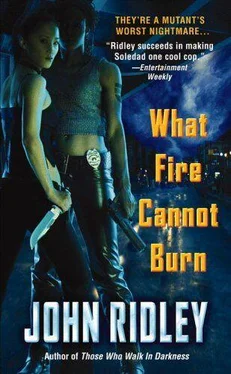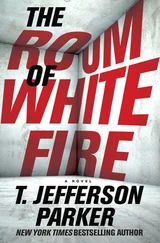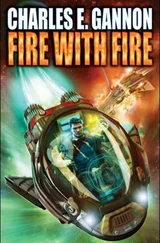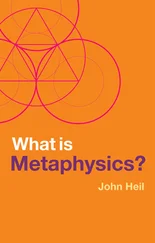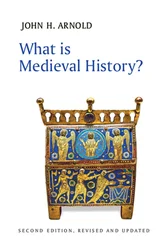Soledad played the message.
The voice she heard had all the distinctiveness of a Swedish automobile. So free of spirit and character it could not be recognized. So bland she had to listen- Soledad actually had to work at hearing-to absorb what the speaker was saying, the voice not self-compelling. Couldn't manage it the first pass. Halfway through, Soledad started the message over. A request for a private meeting, a sit-down to talk about… What was to be discussed was vague, as ill defined as the voice that spoke. At the end of the message: "Oh, yes. I'm sorry. I should have said: This is Tashjian calling."
Soledad had once been nearly dead and buried. Metaphor, of course. Actually, considering her job, not "of course." But in terms of living a life that made her feel alive, the business with IA had just about killed her. Could have landed her in jail too. And the guy who dug her grave-dug it deep, dug it well and was ready to toss the first shovelful of dirt on her not-even-cold body- was Tashjian.
Sapless, swashy, milk-and-water. Tashjian. His voice on her answering machine was reminder to Soledad of what little there was of distinction to the guy. Except for being quite the creep. And being undeniable. He was a fellow who got his way, got what he pleased.
What he wanted was to have a talk with Soledad. And never mind their history-or because of their history, because she ended up free and clear of him-Soledad was glad to take the meeting. To look the bogeyman dead in the eyes.
"I'm not scared of you."
Soledad, Tashjian, were at Pan-Pacific Park, strolling around under the LA sun that was- thanks to a population that refused to stabilize let alone diminish-again losing the fight against the smog that only a few years prior it had begun to get a handle on.
Tashjian responding to Soledad: "I would doubt there's very much you are afraid of. Certainly not me."
"You better believe I'm not."
"And I do."
"You tried to take me out. Didn't work. If you think I'm going to run and hide when you come knocking-"
"You have no fear of me. I take you at your word. But the more you talk… exactly who are you trying to convince, Officer O'Roark?"
At that point, to say nothing more was equal admission Tashjian was right. To let his comment go was backing (Sown, and backing down never felt correct to Soledad. As middle ground: "Just so you understand where I'm coming from. It's not so much that I'm interested in what you've got to say as I am in letting you know I've got no problem with you saying it to my face."
"Understood."
It was odd being out of doors with Tashjian. He was, seemed as though he were, a creature of the shadows. More comfortable in dark than light where his designs could be more easily seen and therefore exposed. A requirement of prestidigitation is that actions be masked. Sleight of hand was Tashjian's expertise. The conceptual dark of others' ignorance was his stage. But here Tashjian was strolling around, walking in the sun just the same as anyone. No longer an object of apprehension, just, more of what he really was. Incredibly normal. Maybe daylight changed Soledad's perception. Maybe it was the change of circumstances; the crushing stone of disciplinary action no longer hanging by a threadbare twine over Soledad's head. Either way, Tashjian didn't seem quite the creep.
"At any rate," he said, "my ultimate objective wasn't to remove you from the department."
"You put a gold medal effort into things for a guy who wasn't trying."
"I told you at the time, I might have been there to help you. You didn't believe me. My intention, my intention was not to bring a good cop to false justice for no reason. It was about getting to the truth. That's what detectives do, be they Homicide, Robbery or Internal Affairs.'''
"I don't have a problem with you getting to the truth. What I've got a problem with is that I told you the truth and you wouldn't take it."
"What kind of detective would I be if I accepted things at face value? It's in the looking you learn to appreciate what you see." As if to demonstrate, Tashjian took a glance around the park. A little spot of green and trees lined by the low-rise apartments, the orthodox business of the Fairfax District.
Tashjian said: "It's in these moments, the casual ones, that I see the reason we do what we
do."
"We? You worked MTac?"
"No. I haven't. I was speaking of police work in general. This" -an arm arched before him-"is why we do what we do."
Soledad looked around, looked at what Tashjian was seeing, A bum, his whole world packed in the Sav-On shopping cart he pushed around the city. A couple of Asian guys, parish skin, shirts off, potbellies revealed, lying out sunbathing. Two softball-playing, Harley-riding, phys-ed-teaching dykes fornicating without care for, concern of, anyone who might be watching.
A cross section of the carnival Los Angeles. Small but representative.
In response to what she saw, to what Tashjian had said: "This? It's a freak show."
A. tic of Tashjian's head. "You and I both know what a freak show is: things disguised as normal but far from. Things that fly, things that change shape or size. Things that, can execute feats which you and I could perform only in our minds and with our best imagining.
"So the oddity around us now, within the city, these very people in the park: They are not so odd, Officer O'Roark. They exist, they are human. They perform simple acts of Irving. They search for love, companionship and meaning in life beyond the cycle of eat, work, sleep. It is these acts that make them human, that drives humanity. And though, per individual, we may not understand or wholly agree with the desires of others, the obligation that you and I and those who are like-minded have undertaken is to ensure normal people have the opportunity to fulfill their legal desires. Our obligation is not just, not merely to protect normal people but also to secure the acts of living to which they are guaranteed. Without that sense of guarantee, would we as people continue as a race or succumb to an emotional extinction? It is hope that gives us a future. So, in aggregate, our job is not to enforce the law. It is nothing less spectacular than to protect the future of humanity. We provide no other service except to ensure a certain peace of mind; that to the best of our abilities we will prevent acts of living from being interrupted. If they are threatened, we will protect. If the life itself is lost, then we will pursue the guilty.
For this social compact to work, you, I, people like us, must follow the letter of the law regardless of our feelings, our personal prejudices or favors. It is the law, as written and interpreted without bias, that must be our guide. Those you may have quarrel with out of uniform, you will offer your protection to under the color of authority.
"If this critical aspect breaks down, I believe- and I say this believing the statement is free of hyperbole-we will find ourselves on a path to anarchy. Worse. To our own destruction.
"We are on such a path, Officer O'Roark. I believe we are. But there is still an opportunity to correct ourselves. So I come to you to ask for your help."
There was nothing but confusion and questions for Soledad. "Help you how? With what? What… what anarchy?"
"You know, of course, of Israel Fernandez."
Soledad's nod "yes'' became a head shake of disgust. A quiet editorial of what she thought of the man.
"His is a death which remains in question," Tashjian said.
"For the freak fuckers. If that's the anarchy you're talking about, as far as I care-"
"You don't. You don't care. For you, yes, that's the natural reaction. But the anarchy I'm talking about is more than a death, or the conspiracy theories that surround it. There have been, over the past fifteen months, several deaths involving people associated with the metanormal community. Some were certainly more questionable than Israel Fernandez's. Some, five of them quite frankly, were murder."
Читать дальше
